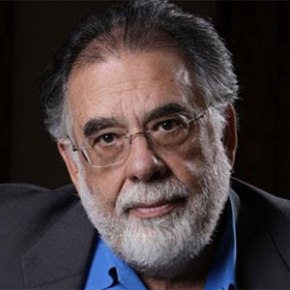Coppola directed in a period of nine days Dementia 13, his first feature from his own screenplay. The film recouped its expenses and later became a cult film among horror buffs. In 1965, Coppola won the annual Samuel Goldwyn Award for the best screenplay (Pilma, Pilma) written by a UCLA student. Coppola bought the rights to the David Benedictus novel You’re a Big Boy Now and fused it with a story idea of his own, resulting in You’re a Big Boy Now (1966). This was his UCLA thesis project that also received a theatrical release via Warner Bros.[16] This movie brought him some critical acclaim. His next film The Rain People in 1969. It was written, directed and initially produced by Coppola himself, though as the movie advanced, he exceeded his budget and the studio had to underwrite the remainder of the movie.[16] The film won the Golden Shell at the 1969 San Sebastian Film Festival. Coppola co-wrote the script for Patton in 1970 along with Edmund H. North. This earned him his first Academy Award for Best Original Screenplay.

The release of The Godfather in 1972 was a milestone in cinema. The near 3-hour-long epic, which chronicled the saga of the Corleone family, received overwhelmingly positive reviews from critics and fetched Coppola the Academy Award for Best Adapted Screenplay, which he shared with Mario Puzo and two Golden Globe Awards: for Best Director and Best Screenplay. After it was released, the film received widespread praise. It went on to win multiple awards, including Academy Award for Best Adapted Screenplay for Coppola. The film routinely features at the top in various polls for the greatest movies ever. It has been selected for preservation in the United States National Film Registry. In addition, it was ranked third, behind Citizen Kane, and Casablanca on the initial AFI’s 100 Years…100 Movies list by the American Film Institute. It was moved up to second when the list was published again, in 2008. Director Stanley Kubrick believed that The Godfather was possibly the greatest movie ever made and had without question the best cast. Coppola’s next film, The Conversation, further cemented his position as one of the most talented auteurs of Hollywood. The movie was a critical success and Coppola won his first Palme d’Or at the 1974 Cannes Film Festival.
In 1990, he released the third and final chapter of The Godfather series: The Godfather Part III. Coppola successfully managed to get Al Pacino, Diane Keaton and Talia Shire to return to the franchise, but Robert Duvall refused to reprise his role as Tom Hagen over salary disagreements. While not as critically acclaimed as the first two films, it was still a box office success, earning a revenue of $136 million against a budget of $54 million. Some reviewers criticized the casting of Coppola’s daughter Sofia, who had stepped into the leading role of Mary Corleone which had been abandoned by Winona Ryder just as filming began. Despite this, The Godfather Part III went on to gather 7 Academy Award nominations, including Best Director and Best Picture. The film failed to win any of these awards, the only film in the trilogy to do so.Coppola shot The Godfather Part II. The movie was released in 1974 and went on to receive tremendous critical acclaim, with many deeming it superior to its predecessor. It was nominated for 11 Academy Awards and received 6 Oscars, including 3 for Coppola: Best Picture, Best Adapted Screenplay and Best Director. The Godfather Part II is ranked as the #1 greatest movie of all time in TV Guide’s “50 Best Movies of All Time” and is ranked at #7 on Entertainment Weekly’s list of the “100 Greatest Movies of All Time”. The film is also featured on movie critic Leonard Maltin’s list of the “100 Must-See Films of the 20th Century”, as well as Roger Ebert’s “Great Movies” list. It was also featured on Sight & Sound’s list of the ten greatest films of all time in 2002, ranking at #4. In 1984 Coppola directed the Robert Evans-produced The Cotton Club. The film was nominated for several awards, including Golden Globes for Best Director and Best Picture (Drama) and the Oscar for Best Film Editing. However the film failed miserably at the box-office, recouping only $25.9 million of the $47.9 million privately invested by brothers Fred and Ed Doumani.
In 1992, Coppola directed and produced Bram Stoker’s Dracula. Adapted from Bram Stoker’s novel, it was intended to be more faithful to the book than previous film adaptations. Coppola cast Gary Oldman in the film’s title role, with Keanu Reeves, Winona Ryder and Anthony Hopkins in supporting roles. The movie became a box-office hit, grossing $82,522,790 domestically, making it the 15th highest-grossing film of the year. It fared much better overseas grossing $133,339,902 for a total worldwide gross of $215,862,692 against a budget of $40 million, making it the 9th highest grossing film of the year worldwide. The film won Academy Awards for Costume Design, Makeup andSound Editing.
FRANCIS FORD COPPOLA INTERVIEW
A LOOK INSIDE THE ‘GODFATHER’
ADVICE FROM FRANCIS FORD COPPOLA